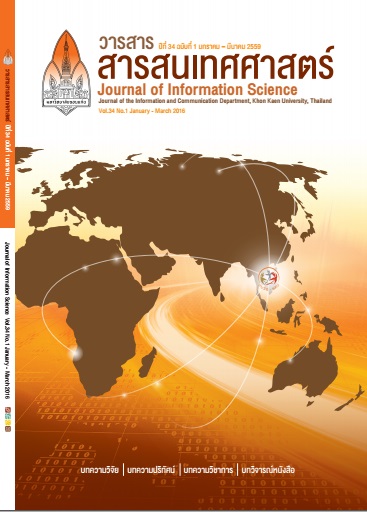แนวทางการศึกษาการจัดระบบความรูภูมิปญญา (Approach to Study of Indigenous Knowledge Organization)
Keywords:
ภูมิปญญา, ระบบความรูพื้นบาน, Local wisdom, Indigenous knowledge, Indigenous knowledge systemsAbstract
บทคัดยอ
บทความแนวทางการศึกษาการจัดระบบความรู้และภูมิปัญญา โดยการสังเคราะห
เนื้อหาวรรณกรรมที่เกี่ยวของกับภูมิปญญา ความสําคัญและความหมาย ประเภท
ภูมิปญญา ลักษณะสําคัญของความรูภูมิปญญา แนวทางการจัดระบบความรูทั้งระบบความรู
สากลและระบบความรภูมปัญญา โดยนำเสนอแนวทางการศึกษาภูมิปัญญาของนักวิชาการ
ทั้งของไทยและตะวันตก อาทิเชน ศูนยคติชนวิทยา คณะอักษรศาสตร จุฬาลงกรณ
มหาวิทยาลัย (2550) ไดศึกษาระบบภูมิปญญาโดยใชกรอบการมองเชิงระบบและทฤษฎี
ทางการสื่อสารและการวิเคราะหและสังเคราะหความหมายภูมิปญญา คุณลักษณะและ
รากฐานของภูมิปญญา และการพิจารณาจากความเชี่ยวชาญของผูใหนิยาม Geertz
นําเสนอแนวทางการศึกษาจาก วิธีคิด ประกอบดวยสวนที่เปนกระบวนการและผลผลิต
ดวยการวิเคราะหตีความ ที่เรียกวา อรรถศาสตรชาติพันธุ (Ethno semantics) Foucault
นําเสนอแนวทางการวิเคราะหภูมิปญญาดวยวิธีการศึกษาชาติวงษ (Genealogy) สวน
Keyes นําเสนอแนวทางวิธีการศึกษา คือ 1) การศึกษาระบบจําแนกของชาวบาน
2) การศึกษาระบบคิดพื้นบ้าน 3) การศึกษาระบบคุณค่าพื้นบ้าน 4) การศึกษาผ่านโลกทัศน์
หรือการตีความของชาวบาน และกาญจนา แกวเทพ นําเสนอแนวทางการศึกษาในฐานะ
ที่เปนเครื่องมือและโครงสรางการวิเคราะหการผลิตและกระบวนการ การวิเคราะหสวนที่
มองเห็นกับสวนที่มองไมเห็น
Abstract
The review outlines the themes that have been available in the indigenous
knowledge literature: the importance of indigenous knowledge, types, characteristics
and the relationship of the indigenous knowledge. The emphasis of the review is
on the analysis and synthesis of the study approaches of the local knowledge,
conducted by western and Thai native scholars. For example, The Folklore
Center of Chulalongkorn University (2007) employed system and communication
theories to analyze and synthesize the definition, characteristics and principles of
indigenous knowledge, expertise of those who provided its definition. Geetz used
ethno semantics with the interpretation technique to examine the process and
outputs of indigenous knowledge. Foucault proposed the study approach using
genealogy to analyze local wisdom. And Keyes divided the study method into 4
items: 1) an examination of indigenous knowledge classification of local people,
2) local people’s thinking system, 3) local value system, and 4) native people’s
interpretation of the indigenous knowledge. Gaewthep proposed the study approach
are tool and structure, product and process, visible and invisible to analyze
indigenone knowledge.








